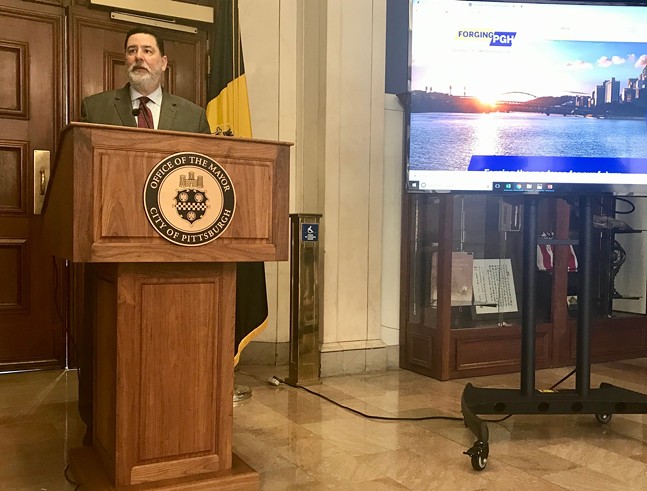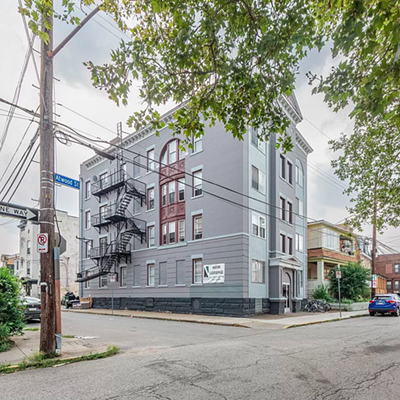
The plan will recommend zoning changes, development priorities, housing strategies, and stormwater suggestions for every neighborhood in Pittsburgh. “A comprehensive plan is a roadmap. It points us toward a shared vision. It is also a standard planning tool that cities use to guide future investment and development,” reads the new ForgingPGH website.
But currently, there are no zoning change proposals or suggestions for neighborhood development priorities. Today’s creation of the Pittsburgh first comprehensive land-use plan is really an announcement of a plan to come about a year from now.
Andrew Dash, Pittsburgh city planning director, said the city will be gathering input from residents over the next 12 months. He said this plan will guide land-use decisions in Pittsburgh for the next 20 years, and should include short-term strategies and long-term goals.
“We are centering this plan in equity,” said Dash, noting that the goals are for land-use decisions to help combat inequities discovered in other city reports.
But no land-use decisions are currently offered to combat these issues. Instead, the city is seeking input from residents through online workshops on how best to address these issues. This could include policies like mandatory inclusionary zoning or density bonuses; whatever the residents of certain communities decide.
“There will be a number of opportunities for residents to participate in the project,” said Dash. “What we are looking for from residents is where they want to see growth and/or things like transportation improvements.”
In Pennsylvania, municipalities have the power to control and regulate how land is developed. Mayors, planning commissions, and city councils basically guide all the development municipalities see.
The goal is to have a comprehensive plan, so that the city, neighborhoods, and other stakeholders are the ones reaching out to developers, not the other way around. After decades of disinvestment in Pittsburgh, it became the norm for developers to seek proposals and then for the city to accommodate them, and for neighborhoods to try to acquire consolations from developers.
Peduto has been mayor since 2014. Before that, he served as a city councilor since 2002. When asked why this plan is being revealed now, and not earlier in his first term, Peduto said that city processes concerning land-use were isolated, and not cooperative.
Earlier this year, when Pittsburgh City Paper asked why Transit-Oriented Development zoning, which would alter code to encourage dense-housing and amenity development near high-frequency transit stops, hasn’t been proposed, Peduto said he would be open to that, but it had to come from the community first. (Most land surrounding Pittsburgh's busway stations has little to no development.)
“This will come down to neighborhoods and the organizations and the neighbors, and what they want to see,” said Peduto at today’s press conference.
While the plan is looking for resident input, Peduto emphasized a pro-growth theme. He mentioned the need to build market-rate housing to increase housing supply, and thus lower the demand that is leading to increasing rents. He also emphasized new development is necessary to help Pittsburgh avoid its continual population decline, which can lead to closing schools and other community assets.
“These are not amenities, they are necessities,” said Peduto.
Peduto said that Pittsburgh is now ready to play offense in terms of a development strategy, and start actively courting developers.
But first, he wants this community-led comprehensive plan. He said Pittsburgh has pockets of hot housing markets, and he doesn’t want to discourage that, but wants plans to help guide future development in those areas.
“We want to work with each community separately, and build a consensus,” said Peduto.
He mentioned the Penn Plaza situation as to when developers were able to make choices that were against community wishes due in part to a lack of a plan. (There were community-led plans for what should be built in the Penn Plaza place, and housing was recommended.) Pittsburgh also already has several neighborhoods with their own community-development plans.
Dash said ForgingPGH is meant to make dealing with the city’s zoning process easier and “get to the development people want to see.”
Two major parts of the plan are to create two reports. One is a housing needs assessment to determine what kind of new housing development is best for each neighborhood. The other is a market-demand and economic opportunity analysis, to see which areas are prime for development.
According to WESA, the process for actually changing city land-use regulations likely wouldn’t come until after mid-2021.


















